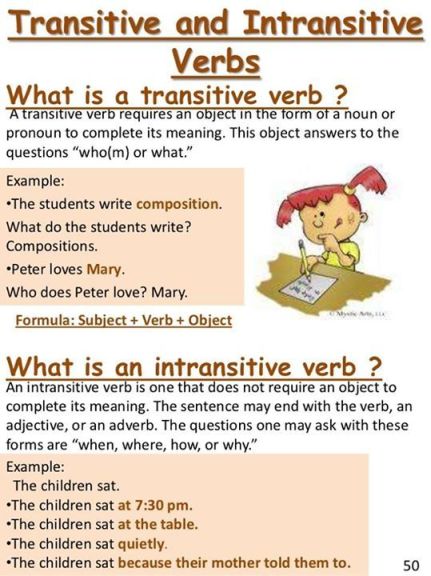When we were children and just beginning to learn our English grammar, many of us no doubt were taken aback by the strange failure of some verbs to work in certain sentence constructions. For instance, perhaps while watching a magician perform in the circus, we might have exclaimed “He gone the rabbit!” and promptly got told off by our parents for our bad grammar. When we probably corrected ourselves by saying “OK, he disappeared the rabbit!” (the way we’d say “Teacher dismissed the class early” without being censured), again we’d be chastised for yet another grammatical gaffe. Then, when the magician finally made the rabbit reappear, we might have confidently said “Now he appeared it again!”—sure this time that by using “appeared” (as in the case of “missed” in “I missed class today”), we could no longer be possibly wrong. But as we might have learned to expect, such a sentence construction was unacceptable, too!

So, we might have asked in exasperation, what seemed to be the matter with such verbs? Why couldn’t “gone,” “disappear,” and “appear” behave like the good, old verbs we knew—verbs like “scare,” “build,” “fix,” and “receive”? Like “missed” above, didn’t these verbs work perfectly in such sentences as “He scared the rabbit,” “Daddy
built a tree house,” “My brother
fixed my bike,” and “My sister
received a love letter”?
Such were the puzzling dilemmas posed by our first encounters with verbs that don’t possess “transitivity,” or the ability to pass on their action to something that can receive it. As we would learn later, of course, “gone,” “disappear,” and “appear” are intransitive verbs, or the kind that simply can’t pass on their action to anything in the sentence. Because they don’t have the power to transmit their action to a so-called direct object, such verbs generally dissipate that action in themselves. When acting as stand-alone verbs, in particular, “gone,” “disappear,” and “appear” can only function in such objectless constructions as these: “The rabbit
goes missing.” “The moon
disappeared.” “The freckles
appeared.” Such verbs absolutely would not admit any takers of their action, even if we put in many more words or phrases to the sentence.
As all of us already know, of course, it’s an altogether different matter when a verb is of the transitive kind. This time, for the sentence to work properly, it needs to provide an object to directly receive the verb’s action. The basic requirement of transitivity, in fact, is that the subject of the sentence—drawing power from the verb—must be able to act on this direct object.
Verbs that require only a direct object to work properly are what some linguists label “one-place transitives,” as the verbs in these sentences: “The woman
received the letter.” “Typhoons
damage infrastructure.” “The professor
delivered the lecture.” When we drop the direct objects “letter,” “infrastructure,” and “lecture,” so that nothing receives the action of the verb anymore, all the three one-place transitive sentences become nonsensical: “The woman received.” “Typhoons damage.” “The professor delivered.” No direct object, no sentence.
We also know, of course, that some transitive verbs not only require a direct object but may also take an indirect object, or a grammatical entity that represents a secondary goal of the verb’s action. Such a verb is the so-called “Vg two-place transitive,” or short for the linguistic label “two-place transitive like give” (the “g” in “Vg” stands for “give). In this verb type, the verb first acts on the direct object and transmits the result of the action to the indirect object, as in these sentences: “He
buys her diamonds.” “She
brings him apples.” “They
served Joanna breakfast.” The indirect objects in these sentences are the pronouns “her,” “him,” and “Joanna,” while the direct objects are “diamonds,” “apples,” and “breakfast.” But the indirect objects are optional in such sentences, which will work perfectly even with only the direct objects around.
The third and last type of transitive verbs carries the “Vc two-place transitive” label, which is short for “two-place transitive like consider” (the “c” in “Vc” stands for “consider”). In such verbs, the action of the verb actually takes place within the subject or doer of the action, or is done to the subject itself, then is transmitted to the direct object: “They
considered the rebellion a lost cause.” “Factual errors like this
make the editors extremely suspicious.” “The beauty queen’s detractors
believe her victory to be a fluke.”
In “Vc two-place transitive” constructions, the verb is followed by a noun phrase working as direct object, onto which must be attached an obligatory complement such as another noun phrase, adjective phrase, or infinitive phrase. These complements, however, unlike the indirect objects of “Vg two-place transitives,” don’t function as indirect objects but modify the direct object instead.
From the book Give Your English the Winning Edge
by Jose A. Carillo © 2009 by Manila Times Publishing. All rights reserved.----
What do you think of my ideas in this essay? Click the Reply button to post your thoughts on Jose Carillo’s English Forum.